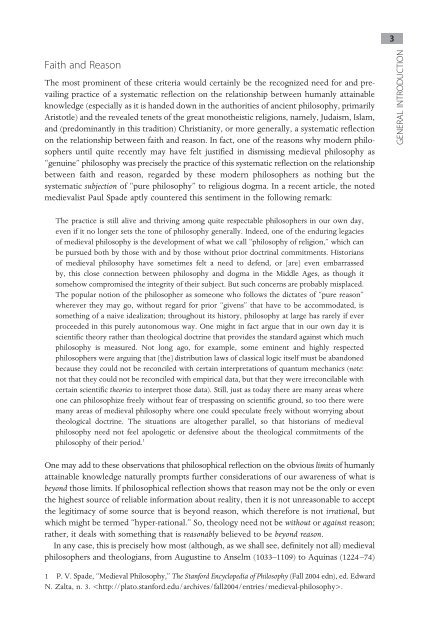Blackwell Readings in Medieval Philosophy - Fordham University ...
Blackwell Readings in Medieval Philosophy - Fordham University ...
Blackwell Readings in Medieval Philosophy - Fordham University ...
Create successful ePaper yourself
Turn your PDF publications into a flip-book with our unique Google optimized e-Paper software.
MP_A02.qxd 11/17/06 5:26 PM Page 3<br />
Faith and Reason<br />
The most prom<strong>in</strong>ent of these criteria would certa<strong>in</strong>ly be the recognized need for and prevail<strong>in</strong>g<br />
practice of a systematic reflection on the relationship between humanly atta<strong>in</strong>able<br />
knowledge (especially as it is handed down <strong>in</strong> the authorities of ancient philosophy, primarily<br />
Aristotle) and the revealed tenets of the great monotheistic religions, namely, Judaism, Islam,<br />
and (predom<strong>in</strong>antly <strong>in</strong> this tradition) Christianity, or more generally, a systematic reflection<br />
on the relationship between faith and reason. In fact, one of the reasons why modern philosophers<br />
until quite recently may have felt justified <strong>in</strong> dismiss<strong>in</strong>g medieval philosophy as<br />
“genu<strong>in</strong>e” philosophy was precisely the practice of this systematic reflection on the relationship<br />
between faith and reason, regarded by these modern philosophers as noth<strong>in</strong>g but the<br />
systematic subjection of “pure philosophy” to religious dogma. In a recent article, the noted<br />
medievalist Paul Spade aptly countered this sentiment <strong>in</strong> the follow<strong>in</strong>g remark:<br />
The practice is still alive and thriv<strong>in</strong>g among quite respectable philosophers <strong>in</strong> our own day,<br />
even if it no longer sets the tone of philosophy generally. Indeed, one of the endur<strong>in</strong>g legacies<br />
of medieval philosophy is the development of what we call “philosophy of religion,” which can<br />
be pursued both by those with and by those without prior doctr<strong>in</strong>al commitments. Historians<br />
of medieval philosophy have sometimes felt a need to defend, or [are] even embarrassed<br />
by, this close connection between philosophy and dogma <strong>in</strong> the Middle Ages, as though it<br />
somehow compromised the <strong>in</strong>tegrity of their subject. But such concerns are probably misplaced.<br />
The popular notion of the philosopher as someone who follows the dictates of “pure reason”<br />
wherever they may go, without regard for prior “givens” that have to be accommodated, is<br />
someth<strong>in</strong>g of a naive idealization; throughout its history, philosophy at large has rarely if ever<br />
proceeded <strong>in</strong> this purely autonomous way. One might <strong>in</strong> fact argue that <strong>in</strong> our own day it is<br />
scientific theory rather than theological doctr<strong>in</strong>e that provides the standard aga<strong>in</strong>st which much<br />
philosophy is measured. Not long ago, for example, some em<strong>in</strong>ent and highly respected<br />
philosophers were argu<strong>in</strong>g that [the] distribution laws of classical logic itself must be abandoned<br />
because they could not be reconciled with certa<strong>in</strong> <strong>in</strong>terpretations of quantum mechanics (note:<br />
not that they could not be reconciled with empirical data, but that they were irreconcilable with<br />
certa<strong>in</strong> scientific theories to <strong>in</strong>terpret those data). Still, just as today there are many areas where<br />
one can philosophize freely without fear of trespass<strong>in</strong>g on scientific ground, so too there were<br />
many areas of medieval philosophy where one could speculate freely without worry<strong>in</strong>g about<br />
theological doctr<strong>in</strong>e. The situations are altogether parallel, so that historians of medieval<br />
philosophy need not feel apologetic or defensive about the theological commitments of the<br />
philosophy of their period. 1<br />
One may add to these observations that philosophical reflection on the obvious limits of humanly<br />
atta<strong>in</strong>able knowledge naturally prompts further considerations of our awareness of what is<br />
beyond those limits. If philosophical reflection shows that reason may not be the only or even<br />
the highest source of reliable <strong>in</strong>formation about reality, then it is not unreasonable to accept<br />
the legitimacy of some source that is beyond reason, which therefore is not irrational, but<br />
which might be termed “hyper-rational.” So, theology need not be without or aga<strong>in</strong>st reason;<br />
rather, it deals with someth<strong>in</strong>g that is reasonably believed to be beyond reason.<br />
In any case, this is precisely how most (although, as we shall see, def<strong>in</strong>itely not all) medieval<br />
philosophers and theologians, from August<strong>in</strong>e to Anselm (1033–1109) to Aqu<strong>in</strong>as (1224–74)<br />
1 P. V. Spade, “<strong>Medieval</strong> <strong>Philosophy</strong>,” The Stanford Encyclopedia of <strong>Philosophy</strong> (Fall 2004 edn), ed. Edward<br />
N. Zalta, n. 3. .<br />
3<br />
GENERAL INTRODUCTION

















